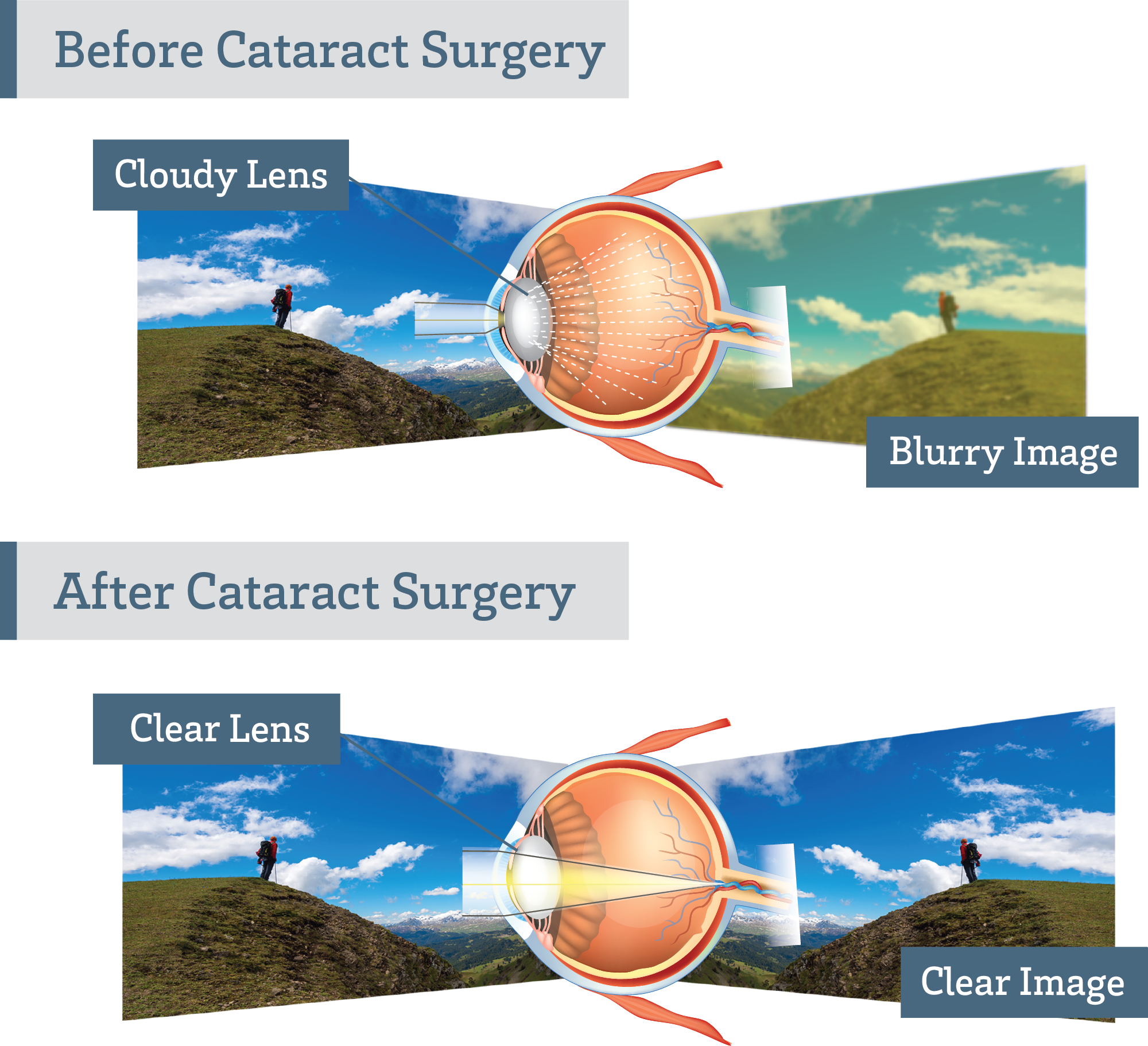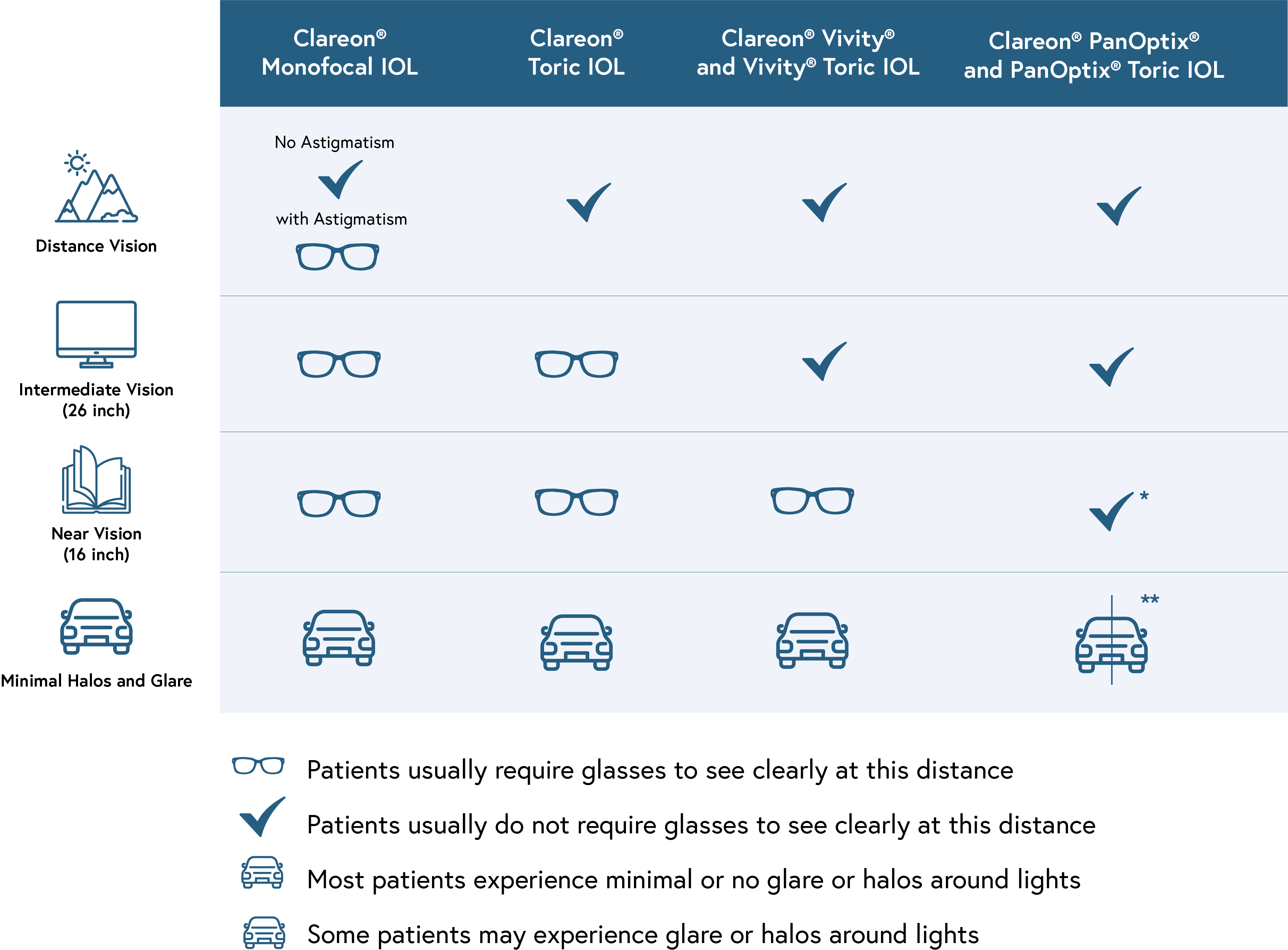


We realize that receiving a cataract diagnosis can be a bit overwhelming. We’ve designed this web page to help simplify the cataract surgery process so you can focus on taking one step at a time.

A cataract is a build-up of proteins within the lens of your eye. A cataract clouds your natural lens, keeping light from passing through which will cause your vision to blur. If a cataract is left untreated, it could cause complete loss of vision. The common complaints are dullness of colors, glare and problems with night driving. Cataracts will gradually limit your ability to perform simple and basic tasks such as reading, driving, seeing road signs and exercising.
Cataracts can be removed through a common, safe surgery. The cloudy lens is removed and replaced with an intraocular lens (IOL). We may recommend basic cataract surgery (using ultrasound to break up and remove the lens) or laserassisted surgery (using a laser to soften the cataract for removal).


The cataract replacement lens you choose can have a lasting impact on what you can see and do. When you discuss your options with your doctor, it’s important to consider what you want to see in your future.

If you have questions about cataract surgery, you are not alone. Think about what you want to get out of surgery. Then, share your questions and hopes with your doctor. This is your once-in-a-lifetime chance to seize life without cataracts.
When you and your doctor have decided that the time is right for cataract surgery, we will begin the process of further analyzing your vision and determining the best replacement intraocular lens (IOL) for you. Our team will perform the following tests:
Some patients may require a medical clearance physical exam, lab work and/or an EKG. These appointments must be made with your primary care physician. All physical exams and lab work must be completed within 30 days of surgery.
Most all cataract surgeries are performed at:
3833 Worsham Ave., Suite 200
Long Beach, CA 90808
10904 Reagan St, Los Alamitos, CA 90720
Please arrange transportation to and from the surgery clinic for the day of surgery and the day after surgery. The surgery center will call you the day before surgery after 5:00 pm with the actual time you have to be there. Plan on being there for 3-4 hours. The surgery takes 10-20 minutes on average, but you have to be admitted, dilated and prepared for the surgery.
Contact lens wear may cause an error in the results of the implant power measurement. To make sure our measurements are as precise as they can be, please follow these instructions.
DISCONTINUE these drops in the surgery eye only:
Other types of glaucoma medication should not be continued unless you are specifically instructed otherwise. All other glaucoma drops should be continued.
The use of FLOMAX must be reported to your surgeon. Flomax works by blocking certain cellular receptors – including receptors that control the iris in your eye. This can cause pupil constriction, making it challenging to remove the cloudy eye lens during cataract surgery. Special measures will be necessary to compensate for the ocular effects of FLOMAX and minimize the risk of any problems.
If you are INSULIN-DEPENDENT your surgery can be scheduled early. DO NOT TAKE YOUR MORNING INSULIN; instead, bring your insulin to surgery for administration after surgery. The surgery Center will call you the day before and tell you exactly what to do with your diabetic medicines. take all other medicines with a small sip of water as usual. If you are taking a semiglutide, like Ozempic, Rybelsus and Wegovy discuss that with your doctor
The following medications can possibly be continued. Discuss these medications with your primary care physician and cataract surgeon.
Coumadin is ussually continued UNLESS your INR test result is more than 3.0 and/or you are undergoing combined cataract and glaucoma surgery. Ask your surgeon if you shoud continue it.
The use of Alpha-blockers: These include alfuzosin (Uroxatral), tamsulosin (Flomax), terazosin (Hytrin), doxazosin (Cardura), and silodosin (Rapaflo) must be reported to your surgeon. These medications work by blocking certain cellular receptors – including receptors that control the iris in your eye. This can cause pupil constriction, making it challenging to remove the cloudy eye lens during cataract surgery. Special measures will be necessary to compensate for the ocular effects of Alpha-blockers and minimize the risk of any problems. You do not need to stop these medicines before surgery.
Begin using your eye drops in your operative eye as follows;
OR
You only need one eye drop from each bottle (more is not harmful at a single time), in any order that you like. It doesn’t matter which bottle of eye drops you use first. It is important that you wait 5 minutes between each eye drop so that each medicine has a chance to be absorbed before the next.
Completely and thoroughly remove all face makeup the night before. This includes all types of oils, lotions, sunscreen, facial moisturizer, liquid foundation, powder, eyeliner, mascara, eyebrow pencil and eye shadow. Lipstick is okay.
Wash your hair so it can be avoided for the first 5 days after surgery.
The surgery center will call you the day before surgery after 5:00 pm to let you know what time to arrive for your procedure. Please arrange transportation to and from the surgery clinic for the day of surgery and the day after surgery. Plan on spending 3-4 hours with us.
Most all cataract surgeries are performed at:
3833 Worsham Ave., Suite 200
Long Beach, CA 90808
10904 Reagan St, Los Alamitos, CA 90720
Please arrange transportation to and from the surgery clinic for the day of surgery and the day after surgery. The surgery center will call you the day before surgery after 5:00 pm with the actual time you have to be there. Plan on being there for 3-4 hours. The surgery takes 10-20 minutes on average, but you have to be admitted, dilated and prepared for the surgery.
If you are INSULIN-DEPENDENT your surgery will be scheduled early. DO NOT TAKE YOUR MORNING INSULIN; instead, bring your insulin to surgery for administration after surgery.
You’re almost there. Here’s what you can expect during surgery:
Take it easy. Resume your pre-operative drops and start any additional medication given to you on discharge. Watch TV if you like. You may read if it doesn’t cause any discomfort. Resume your normal diet. Do not strain to lift, don’t rub your eye.
Take 1-2 Tylenol tablets every 4-6 hours if needed for mild discomfort. Call if that is insufficient. Blurry vision, tearing and a sandy feeling are common the first day after surgery. Close your eyes to rest them if this occurs.
For serious discomfort call at any time.
All patients must be seen the day after surgery by your surgeon or one of our associates. The eye will be examined and instructions reviewed. Please have someone drive you to your appointment.
Avoid getting soap in your eye. Avoid creams lotions and makeup around the operated eye. Wear eyeglass protection, especially outdoors. Use moderation in your activities; walking, running and golf are OK. Wash your hands carefully and avoid touching or rubbing your eye. Do not swim, lift weights or engage in contact sports, including tennis or racquetball.
Don’t engage in weightlifting or activities risking direct impact on your eye. Aerobics are ok as long as there is no high impact and you don’t get any sweat in the eye. Wash your hands carefully and avoid touching or rubbing your eye. Wearing eye makeup is okay. There may be some redness, itching, mild discomfort or bruising around the eye. These sensations will decrease and your vision will improve progressively.
We may give you a new prescription for glasses. You may wish to fill this prescription at our Optical Gallery. Ask your physician whether there are any continuing activity restrictions.

“Everyone answered all of my questions. I felt very comfortable having my surgery. On the day of the surgery, everyone was very nice. They explained what they were doing and what would happen next. The surgery was finished so quickly and I had no pain. I can now read without glasses.”
– B. Harrington
“They say that life begins at ‘forty,’ oh no. Thanks to Eye Physicians of Long beach, life has begun again for me at ‘eighty.’ After the surgery I saw things I never knew the true color of, a sink I used every day I didn’t know that it had gold trim on it. The TV looked like it was brand new so clear and sharp with lots of color. I could go on and on. I’m so very happy and feel so blessed to have found EPLB. I tell everyone I meet about this experience so they too could do this and bring color into their lives.”
– L. Babb


“I was so scared when I first heard about this treatment and I am sure you feel the same way. Please understand that you are in very good hands. I have worn glasses my whole life and now have perfect vision due to the surgery, which means NO MORE GLASSES!!! This has changed my life in many ways so I assure you that you will have no regrets in the end and will be amazed with this surgery.”
– C. Howell
Our board-certified surgeons have a combined total of over 90 years of vision correction surgery experience. EPLB was the first in Long Beach to:
Cataract surgery is generally done under topical anesthesia. We put drops on the eye and give you a mild sedative to help you relax. If you are having cataract surgery under topical anesthesia, you need medical clearance only if you are on supplemental at-home oxygen or have chest pain. If you are having more than cataract surgery or more than topical anesthesia, your doctor will tell you if you need clearance. The following are the requirements per anesthesiology:
Please discuss with your surgeon if you have any of these conditions to ensure that the appropriate clearance is done prior to cataract surgery.
The day before surgery, the surgical center will let you know what medications you should stop or continue on the day of surgery.
The outcomes indicated that phacoemulsification cataract surgery under topical anesthesia could be safely performed without ceasing systemic aspirin therapy without significantly increasing the risk of bleeding. The discontinuation of this class of drugs before cataract surgery may increase the risk of thromboembolism, stroke, etc., so we do not stop any anticoagulants before surgery unless your doctor instructs you differently. This does not mean that there is no risk of bleeding but that the risk of bleeding during cataract surgery is low enough and the risk of stopping this medication and the possibility of stroke or heart attack is worse. If you are on warfarin (Coumadin), we will want an INR, which is a measure of your body’s ability to clot.
Yes. Most patients start their surgery-related eye drops one day prior to surgery. Please refer to your medication instructions sheet provided to you in your blue patient folder for detailed instructions.
The surgical center should give you a call the day before your scheduled surgery with the exact arrival time.
Yes. You will need to fast for at least 6 hours prior to arrival time.
Usually, twilight or local anesthesia is used during cataract surgery. Anesthetic drops are applied to the eye and a small amount of medicine is administered intravenously. If you are still restless during the procedure, we may have to give you more sedation, including possible general anesthesia.
The total process, from the time a patient enters the surgical center to the time they leave, is approximately 3-4 hours. The procedure itself will start about 2 hours after you come in because you need to be dilated and prepared for surgery. Surgery itself typically takes 20 minutes. You will remain at the surgical center for 30-40 minutes after surgery before you are able to go home.
Generally, no, cataract surgery does not hurt. In addition to medication to relax you before your surgery, the anesthetist will numb your eye with anesthetic eye medication prior to the procedure. As the medications wear off, you may feel a scratchy sensation or slight soreness in your eye on the first day.
No. You will need to bring a driver with you, or somebody to accompany you on the ride home if you will be using public transportation.
Common side effects after cataract surgery include blurred vision, itchy, scratchiness, and foreign body sensation. This is normal and should go away with time. It usually takes about a week before you can see the benefits of cataract surgery.
Your vision after cataract surgery depends on several factors, including the size of the cataract and the health of your eye. Vision in the first week is different for everyone and does not indicate a bad outcome. Blurred vision without pain and redness is usually expected. Some mild discomfort is also usually expected for the first couple of days. In most cases, patients can see better within a week after surgery. You should talk to your eye doctor if your blurring persists.
Yes. Avoid rubbing or touching your eyes and avoid getting water or dirt in the eyes for at least 1 week after surgery. Avoid bending over and lifting objects heavier than 25 lbs for at least 1 week after surgery.
No, you do not need to wear sunglasses after cataract surgery. However, many patients may find that they are more light-sensitive since more light is entering the eye post-surgery. You may choose to wear sunglasses for your own comfort. A pair of dark shades is provided for you in your medication kit.
If you feel you have good vision and feel safe enough to do so, you may drive the day after surgery. It is best to have a driver available for your 1-day post-operative visit. We advise against driving unless you feel you can do so safely. You may need to remove the lens in your glasses on the operated side to be able to drive.
Your doctor may have you refrain from vigorous exercise for the first week or two after surgery. Avoid lifting or deep bending for several days after surgery as these activities can increase eye pressure. Generally, you should refrain from lifting over 20 pounds, sitting in a spa, running, and jogging for the first week. You should also avoid submerging your head underwater (i.e. swimming, snorkeling, etc.) for at least 1 month after surgery.
You do not need to wear an eyepatch; however, you will need to wear a protective clear plastic shield over the operated eye while you sleep.
Avoid showering if possible. You may shower only from neck down for at least 5 days after surgery. Do not wash your hair for at least 5 days after surgery. If you must have your hair washed, have a professional wash your hair for you. Close your eyes to avoid direct contact with soap or water.
Do not wear makeup for at least 1 week after cataract surgery.
Depending on scheduling you may be asked to see one of the other doctors on our team for some of your immediate care after surgery.
You will not harm your eyes by wearing your old glasses. However, you may prefer not wearing them since, in most cases, your vision will have improved after surgery, in particular your distance vision. Bring your glasses the day after surgery and we can remove the lens out of the glasses on the operated side. If your prescription in the other eye is very high you may have trouble with balance. Do not engage in any high-risk activity if you do not feel you can use your two eyes well together.
Typically, a month or so after surgery is a good time to check your glasses prescription. If you have a doctor who usually checks your eyes for glasses, you should call their office and arrange this appointment yourself. If you do not have a regular doctor who checks your eyes for glasses, or you usually see a doctor in this office, your glasses checkup is the last appointment scheduled on your postoperative surgical instruction card.
Yes. If you have an accommodating lens, you will need to wear reading glasses and slowly start to taper off them. You will most likely start with +2.50 reading glasses. When you can read comfortably with those reading glasses, you will decrease the power of the reading glasses by 0.50. You may have some difficulty as you decrease the power of the reading glasses; start with reading the material a little further away and gradually bring them in closer to your face until you are at your usual reading distance. When you can comfortably read at that power, continue to decrease the power of the reading glasses until you are completely rid of them. Because you will be using muscles that you haven’t used in a while, you may experience some brow ache.
Yes. Wear UV protection at all times, even when inside the house and at night. UV protection must be maintained at all times until the prescription is locked in.
Yes. Most patients will be on eye drops for at least 1 month after surgery to reduce inflammation and prevent infection. These medications can vary depending on each patient, and your surgeon may adjust your medications and dosage after surgery depending on your condition. Please refer to the medication instructions and calendar provided to you in your blue patient folder.
After glaucoma and/or cataract surgery, you should continue your glaucoma medications unless your doctor instructs you otherwise. You should only stop the glaucoma drops if you have been instructed. We usually stop glaucoma medicines for patients who have had a trabeculectomy, Ahmed or Baerveldt shunt.
You may resume taking all your medicines, without exception, immediately after surgery unless your doctor specifically instructs you otherwise.
Your bottles have the right amount of medication in them. You will not need any refills unless you are pressing hard or having to repeat the application. Simply use your eye drops until the bottles are empty. Some may be used up before others. If you run out of medications, you can call our office for a refill prescription.
No. You will not overdose. If you miss your eye, you should try again. It is important to make sure you get the drops in.
You should wait at least 5 minutes between your different drops. The order does not matter.
3833 Worsham Ave., Suite 200
Long Beach, CA 90808
10904 Reagan St, Los Alamitos, CA 90720
Please arrange transportation to and from the surgery clinic for the day of surgery and the day after surgery. The surgery center will call you the day before surgery after 5:00 pm with the actual time you have to be there. Plan on being there for 3-4 hours. The surgery takes 10-20 minutes on average, but you have to be admitted, dilated and prepared for the surgery.
Please reach out to our office at (562) 799-2020, or to one of our surgical coordinators:
Alicia Perez - (562) 502-1173 Laura Hernandez - (562) 502-1180